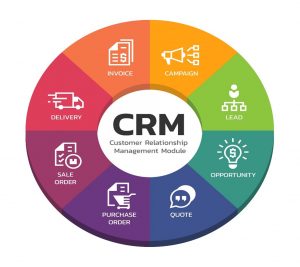

In the swiftly changing realm of customer relationship management (CRM), maintaining a competitive advantage is crucial for businesses seeking to drive growth and promote enduring customer loyalty. As we venture into 2024, several innovative trends are shaping the CRM landscape, promising to develop how businesses engage with their customers. Let’s explore 15 of these groundbreaking CRM trends that are worth paying attention to.

AI-Powered Personalization
Artificial Intelligence (AI) continues to reform CRM by enabling hyper-personalization at scale. In 2024, AI systems are becoming even more sophisticated, leveraging vast amounts of customer data to deliver tailored experiences in real-time. From personalized product recommendations to dynamic content customization, AI-driven personalization is reforming how businesses interact with their customers, driving higher engagement and conversion rates.
Voice-Activated CRM
With the rising popularity of voice assistants like Siri, Alexa, and Google Assistant, voice-activated CRM is gaining traction in 2024. Businesses are integrating voice recognition technology into their CRM systems, allowing sales teams to access critical information hands-free and execute tasks more efficiently. Voice-enabled CRM helps to streamline workflows and enhances user experience by enabling unified interaction with CRM platforms through natural language commands.
Blockchain for Data Security
Data security remains a top priority for businesses in 2024, especially with the increasing prevalence of cyber threats. Blockchain technology is emerging as a game-changer in CRM by offering unparalleled security and transparency in data management. By leveraging blockchain, businesses can ensure the integrity and immutability of customer data, enhancing trust and compliance while reducing the risk of data breaches.
Augmented Reality (AR) for Enhanced Customer Engagement
Augmented Reality is transcending its novelty status to become a powerful tool for customer engagement in 2024. CRM platforms are integrating AR capabilities to offer immersive experiences, allowing customers to visualize products in real-world environments before making a purchase. Whether it’s trying on virtual clothing or previewing furniture in their living space, AR-driven interactions are reforming the way customers engage with brands, driving higher satisfaction and loyalty.
Predictive Analytics for Anticipatory Service
Predictive analytics is evolving beyond forecasting to enable anticipatory service in CRM. By analysing historical data and customer behaviour patterns, predictive analytics procedures can anticipate future needs and proactively address issues before they arise. Whether it’s predicting maintenance requirements for industrial equipment or forecasting inventory demands, anticipatory service powered by predictive analytics is empowering businesses to stay one step ahead in meeting customer expectations.
Integration of IoT Data
The Internet of Things (IoT) is generating a wealth of real-time data that holds immense potential for CRM applications. In 2024, businesses are connecting IoT data to gain deeper insights into customer behaviour and preferences. By integrating IoT devices with CRM systems, businesses can track product usage, monitor equipment performance, and deliver proactive support based on real-time data streams. The integration of IoT data enriches CRM functionality, enabling personalized experiences and predictive analytics driven by real-world interactions.

Emotional Intelligence in Customer Interactions
In an era where emotional connection drives customer loyalty, CRM is embracing emotional intelligence to enhance customer interactions. AI-powered sentiment analysis tools analyse customer communication channels, such as emails, chats, and social media interactions, to measure emotional cues and sentiment. By understanding and responding to customers’ emotions effectively, businesses can foster deeper connections, resolve issues empathetically, and build stronger relationships that endure beyond transactional interactions.
Hyper Automation
In the pursuit of operational efficiency and agility, businesses are turning to hyper automation—a strategy that combines robotic process automation (RPA) with AI and machine learning capabilities. By automating repetitive tasks and workflows across the CRM ecosystem, hyper automation updates processes, reduces manual errors, and frees up human resources to focus on high-value activities. CRM platforms are embracing hyper automation to drive productivity gains and quicken digital transformation initiatives.
Conversational AI
As conversational AI technologies continue to mature, Organizations are leveraging chatbots and virtual assistants to enhance customer interactions and support services. CRM platforms are participating conversational AI capabilities to provide instant assistance, answer queries, and guide customers through their journey seamlessly. By offering round-the-clock support and personalized recommendations, conversational AI improves customer satisfaction, reduces response times and enhances operational efficiency.

Subscription-Based Models
In the era of the subscription economy, businesses are shifting towards subscription-based models to provide recurring value and drive long-term customer relationships. CRM platforms are adapting to accommodate subscription billing, automated renewals, and subscription management functionalities. By leveraging CRM to track subscriber preferences, analyse usage patterns, and personalize subscription offerings, businesses can maximize customer lifetime value and minimize rates in the subscription economy.
Data Ethics and Privacy
As data privacy regulations become more stringent and consumer privacy concerns grow, businesses are prioritizing data ethics and privacy in their CRM practices. CRM platforms are implementing strong data governance frameworks, encryption protocols, and consent management tools to safeguard customer data and ensure compliance with global privacy regulations. By adopting transparent data practices and empowering customers to control their data preferences, businesses can build trust and credibility while modifying the risks associated with data breaks and regulatory fines.
Collaborative CRM
In an increasingly interconnected business environment, collaboration is essential for delivering seamless customer experiences and driving business growth. In 2024, CRM platforms are embracing collaborative CRM, which enables cross-functional teams to share customer information, collaborate on tasks, and coordinate activities in real-time. By breaking down storage and fostering collaboration between sales, marketing, customer service, and other departments, collaborative CRM improves coordination, hastens decision-making, and delivers a unified customer experience across the organization.
Personal Data Portability
CRM systems are implementing personal data portability features, enabling customers to download their CRM data in a standardized format and transfer it to other platforms seamlessly. In response to growing demands for data sovereignty and control, businesses are embracing personal data portability—a concept that allows customers to access and transfer their personal data between different service providers. By allowing customers to take ownership of their data and switch providers more easily, personal data portability promotes competition, innovation, and customer empowerment in the CRM market.

Continuous Customer Engagement
In the age of hyper-connectivity and digital noise, capturing and retaining customer attention requires continuous engagement and relevance. And CRM systems are adopting strategies for continuous customer engagement, such as personalized content delivery, interactive experiences, and gamification techniques. By nurturing ongoing interactions and fostering community engagement, businesses can build stronger relationships with customers, increase brand loyalty, and drive advocacy in a crowded marketplace.
Customer Experience
In the pursuit of delivering exceptional customer experiences, businesses are adopting customer experience arrangement as a crucial CRM trend in 2024. This approach involves the strategic coordination of touchpoints, channels, and interactions throughout the customer journey to create a unified and seamless experience. By leveraging advanced analytics and automation, businesses can anticipate customer needs, personalize interactions, and deliver consistent messaging across all channels. Customer experience enables businesses to delight customers at every touchpoint, driving satisfaction, loyalty, and advocacy. As customer expectations continue to evolve, mastering the art of experience orchestration becomes essential for businesses seeking to differentiate themselves in competitive markets and foster long-term relationships with their clientele.
Final Thoughts
As businesses navigate the dynamic landscape of customer relationship management in 2024, it becomes imperative to embrace innovative trends that enhance engagement, drive growth, and foster long-term customer loyalty. With the expertise of leading CRM service providers like BriskWinIT Solutions, leveraging innovative technologies such as AI-driven personalization, blockchain-powered security, and AR-enhanced engagement becomes more accessible. By staying ahead of the curve and integrating these trends into our CRM strategies, businesses can position themselves for success in the digital age, ensuring meaningful interactions and sustainable growth for years to come.
As per CRM Charts of infetech.com,

Frequently Asked Questions
This FAQ section aims to address common questions and provide further insights into the innovative CRM trends outlined in this guide.
What is CRM, and why is it important for businesses?
Customer Relationship Management (CRM) refers to the practices, strategies, and technologies that businesses use to manage and analyse customer interactions throughout the customer lifecycle. CRM is important for businesses because it helps them build strong relationships with customers, streamline processes, increase sales, and improve customer satisfaction and loyalty.
What are some examples of AI-powered personalization in CRM?
AI-powered personalization in CRM includes features such as recommending products based on past purchase history, sending personalized marketing emails based on customer preferences, and providing tailored recommendations and offers in real-time through AI procedures analysing vast amounts of customer data.
How does blockchain-based security enhance CRM platforms?
Blockchain-based security enhances CRM platforms by providing a decentralized and tamper-proof system for storing and sharing customer data. This technology ensures data integrity, prevents unauthorized access, and enhances transparency and trust in CRM interactions.
How can businesses leverage augmented reality (AR) in CRM?
Businesses can leverage AR in CRM by offering immersive experiences such as visualizing products in real-world environments, providing interactive troubleshooting guides, and enhancing customer support through AR-enabled applications.
What is hyper automation, and how does it benefit CRM processes?
Hyper automation combines robotic process automation (RPA) with AI and machine learning capabilities to automate repetitive tasks and workflows across the CRM ecosystem. This approach updates processes, reduces manual errors, and enhances efficiency, allowing businesses to focus on high-value activities and improve overall CRM performance.
How does sustainable CRM contribute to business success?
Sustainable CRM contributes to business success by integrating sustainability principles into CRM strategies, diminishing environmental impact, promoting social responsibility, enhancing brand reputation, attracting eco-conscious customers, and driving long-term value creation.
What are some key challenges businesses may face when implementing these innovative CRM trends?
Key challenges businesses may face when implementing innovative CRM trends include data privacy and security concerns, integration complexities, resistance to change from employees, and the need for specialized skills and expertise in emerging technologies. Overcoming these challenges requires careful planning, strategic investment, and continuous adaptation to evolving market dynamics.
How can businesses stay updated on the latest CRM trends and technologies?
Businesses can stay updated on the latest CRM trends and technologies by actively engaging with industry publications, attending conferences and seminars, participating in webinars and workshops, networking with peers and industry experts, and partnering with reputable CRM service providers and consultants who specialize in emerging technologies and best practices.
Contact BriskWinIT Solutions
Let’s take a moment to envision the possibilities that lie ahead in the realm of CRM for 2024. As a reader, you’re not merely observing these trends from the sidelines; you’re an integral part of the narrative, with the power to shape your business’s trajectory. Imagine yourself at the forefront of innovation, collaborating with forward-thinking CRM service providers like BriskWinIT Solutions to connect the full potential. Consider this your invitation to take the reins, delve into the dynamic realm of CRM, and embark on an expedition of exploration and advancement that surpasses the conventional.
The future is yours to create – are you ready to embrace it? Please do not forget to let us know your thoughts.